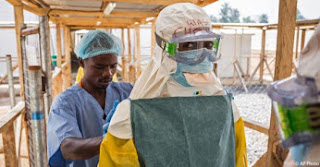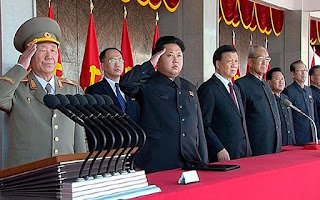A Lesson …in Crisis Preparedness
A
Lesson …in Crisis Preparedness
By
E. Stanley Ukeni
I am of the conviction that success springs from the
seeds of deliberate preparedness, and is sustained by tenacious vigilance. This
conviction was aptly demonstrated by Nigeria Health Ministry’s impressive
efforts to contain and manage the Ebola outbreak in the country of a Hundred
and Seventy million inhabitants—with all kinds of variables to contend
with.
Amidst the incessant corruption and resource
mismanagement that has historically plagued the country, its current
leadership’s ability to stem the spread of this highly virulent disease is
nothing short of remarkable. I trace the
Nigerian government’s current success in halting a nation-wide spread of the
deadly Ebola scourge to a singular initiative—preparedness.
My investigation into the nature of this
preparedness revealed some of the strategic initiatives that the Nigerian
government employed to prepare for all eventualities—long before the late
Liberian-American, Mr. Patrick Saywer introduced the dreaded Ebola Virus
Disease (EVD) into Nigeria. I learnt from a reliable source that, as the Ebola
pandemic ravaged parts of the Nations of Guinea, Sierra Leone and Liberia, the
Nigerian Ministry of Health—under the leadership of Professor Dr. Onyebuchi
Chukwu, quietly developed and deployed strategic disease surveillance and
control initiatives as a preemptive measure against the spread of EVD in
Nigeria in the event that an outbreak occurred.
Some of these initiatives employed by the health
ministry included the following;
·
The country quietly stockpiled
bio-hazard suites for front-line emergency medical responders.
·
Hospitals and Medical centers were
instructed on methods of disease detection, and confirmation procedures.
·
Quarantine measures were developed, and
surveillance process adopted.
·
The government ensured that there would
be no disruptions in the distribution chain of life essentials, in other to
avoid unnecessary social panic.
·
Medical first responder were adequately
trained and given necessary logistical support.
In other to maintain continuing vigilance against
complacency in their efforts to keep Ebola Virus Disease (EVD) in check, the
Health Ministry quickly elicited the cooperation of the internal intelligence
assets of the country in the effort to effectively track the movements of
quarantined individuals, in the event they breached containment. This
particular initiative yielded good results in containing the wider spread of
the Ebola epidemic in Nigeria, when individuals who were placed in isolation
escaped and went into hiding—putting the lives of the broader citizenry at
risk. These individuals were quickly located and successfully returned to
quarantine. Equally remarkable, is the fact that virtually everyone who came in
contact with these renegade individuals were promptly identified and placed
under immediate observation.
If governments across the West African region had
adopted, and perhaps even scaled-up,
these preparatory initiatives that the
Nigeria government implemented, there would have been little need for them to resort to some of the draconian
measure they implemented, such as boarder closures and flight restrictions and trade
ban with effected countries.
In response to those drastic and irrational
decisions by governments and corporate entities to ban flights to affected
countries, WHO has called on airlines to remove restrictions to flights from
and to the Ebola affected West African countries, stating that travel bans were
threatening efforts to beat the epidemic. Sadly, driven by, perhaps, the
instinct of self-preservation, many African leaders refused to heed this call
to rational reason.
President John Dramani Mahama—the Chairman of
ECOWAS, echoed the WHO sentiment when he said, while announcing that Accra,
Ghana would host a strategic outpost for the conveyance of vital medical
supplies and personal to Ebola-effected countries in the West African region, that “…some countries have placed bans on
vessels entering the Ebola affected countries. This, combined with cancellation
of flights to the affected countries, is creating difficulty in sending vital
supplies to the affected country. This is negative.”
The African Regional Director of WHO, Dr. Louis
Sambo, have tasked the leaders of African countries to stop disregarding WHO
guidelines for the containment of the Ebola outbreak. He warned that failure to
abide by WHO approved strategies could worsen the plight of the inhabitants of
effected countries.
In light of the above discussed policy debacle by a
number of ECOWAS States, it is apparent that governance synergy needs to be improved
amongst the ECOWAS intergovernmental contact groups, so as to help forestall
future disjointed policy initiatives by the countries that make up the regional
economic block—especially during times of regional crisis management.
The nation Nigeria showed remarkable leadership in
the manner in which it managed the Ebola Virus Disease (EVD). It is imperative
that the other ECOWAS countries learn from this demonstration of mature
leadership, in a time of crisis, so that the region can begin to embrace the
notion of collective responsibility. There needs to be a realization that the
ECOWAS region must grow together or risk a continued economic stagnation, which
would negatively affect the quality of life and wellbeing of its citizens.
By Stanley Ukeni,
Copyright 2015. All Rights
Reserved.
photo courtesy of the US CDC
photo courtesy of the US CDC



Comments
Post a Comment